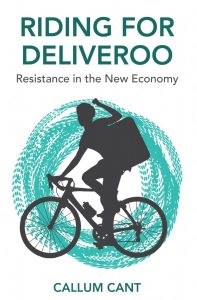In Riding for Deliveroo, Resistance in the New Economy, Callum Cant offers a new study of the labour processes and resistance dynamics of Deliveroo couriers in Brighton, drawing on his work as a Deliveroo rider for eight months, helping to organise strikes and taking part in unionising efforts. Elisa Pannini recommends this enjoyable and accessible book to anyone interested in understanding the mechanisms behind the platform economy and the issues related to organising platform workers.
Riding for Deliveroo: Resistance in the New Economy. Callum Cant. Polity. 2019.
 While most people were staying home during the peak of the COVID-19 crisis this year, key workers kept delivering essential services. Among them, Deliveroo riders cycled or drove across cities to deliver takeaway food, despite shrinking orders and closed restaurants. To face its own crisis during lockdown, Deliveroo had to search for new investors and new business opportunities, like partnerships with supermarkets for grocery deliveries.
While most people were staying home during the peak of the COVID-19 crisis this year, key workers kept delivering essential services. Among them, Deliveroo riders cycled or drove across cities to deliver takeaway food, despite shrinking orders and closed restaurants. To face its own crisis during lockdown, Deliveroo had to search for new investors and new business opportunities, like partnerships with supermarkets for grocery deliveries.
The present and future of Deliveroo and similar companies are uncertain and open to very different outcomes, and so are the working lives of their riders. In his book, Riding for Deliveroo: Resistance in the New Economy, Callum Cant shows the labour processes and resistance dynamics of Deliveroo couriers in Brighton, UK. The book makes at least three important contributions: one related to its research method and theoretical framework; one related to its storytelling; and one related to the general issue of organising precarious workers.
First of all, Cant frames his inquiry within the Italian Workerist tradition, which puts workers at the core of its analysis. The workers’ inquiry method assumes the workers’ point of view in analysing the labour process; it is not just a detached observation, but requires the researcher to be proactive, to the point of joining the workforce, and to participate in organisational activities. The information gained through this perspective is used to understand the ‘class composition’ of the workforce, with focus on the technological nature of the job, the social characteristics of the workers and their political identity. The choice of this approach contributes to bringing into the spotlight the everyday experiences of workers instead of more abstract issues; I personally appreciated this framework, because within this method workers become active subjects in the debate, instead of passive objects of observation.
The second contribution of this book lies in the stories it tells. Cant worked as a Deliveroo rider for eight months, helping to organise strikes and taking part in unionising efforts. He recalls experiences, thoughts and anecdotes, telling the reader not just technical details of the job, but also stories about cycling at night, nearly missing a collision with a car and arguments with other road users. The accessible writing style and unmediated account of the working experience makes the book an easy read for anyone who wants to understand the nature of platform work, the riders’ needs and interests and their real struggles. For example, Cant points out that when discussing the job with riders, one of their primary concerns was the waiting time in some restaurants, because it dramatically reduces the amount of deliveries they can achieve and the money they can earn. Bigger concerns like riders’ employment status are undoubtedly relevant to the overall work experience, but all workers’ grievances should be listened to with an open mind, and this book helps readers to understand why.

The third contribution is a substantial one. The decline of unions in recent years goes hand in hand with the diminishing power of the working class. Workers’ isolation and scattered workforces are the result of a conscious labour process design, and they are often considered almost insurmountable obstacles to organising workers. However, Cant shows how workers have been discussing their issues through casual meetings and via group chats on their phones, even before getting in contact with more formal organisations. If the help of independent unions has been important for setting up bigger strikes and demonstrations, the means for connecting had been already developed by the workers themselves. This insight into the mechanisms that make the organising of platform workers possible can be greatly useful in the debate related to union revival and workers’ protection.
The book is rich with other interesting insights that provide food for thought. For instance, some readers might be surprised by the existence of ‘dark kitchens’, sites owned by Deliveroo or similar companies that are rented out to busy restaurants to run a second kitchen just for deliveries. Also, interesting considerations are made about the risks taken daily by riders on the road. We are used to thinking about companies shifting ‘economic’ risks to individual workers, by denying them the status of employees and insisting that they are self-employed. Cant makes clear that through the way these companies operate, work intensification means that riders are pushed to be less careful on the road, to drive faster and take higher risks to deliver more orders and make an acceptable amount of money at the end of their shift. This is not just economic risk; it is the actual risk of getting physically hurt. These mechanisms of work intensification and the push towards self-exploitation resonate with tendencies that have wider purchase, including in companies working in traditional sectors outside the gig economy.
The weakest point in the book is its outlook on the future of food delivery platforms. Cant recognises the difficulties in successfully implementing ‘platform cooperativism’ in competition with existing platforms as a solution to the workers’ lack of control over the labour process; but at the same time, he wishes for a reorganisation of the system from below, starting from an expropriation led by workers themselves. But if a cooperative version of Deliveroo is unlikely to be successful, the chances of a more radical socialist solution are even more debatable.
The other two options considered for the future are the complete fulfilment of company bosses’ desires and a corresponding loss of workers’ power, or a liberal progressive approach that would slightly improve workers’ conditions. However, as we have seen, when most of the UK population was housebound during the peak of the COVID-19 pandemic, and the situation looked ideal for food delivery platforms, Deliveroo had to face one of its worst crises of liquidity and revenues. The possibility that this business model will not be viable in the long term, with or without a dramatic revolution coming from the workers, should be considered as well.
Overall, the book is an enjoyable and accessible read that sheds light on the functioning of food delivery companies and the struggles faced by some of their workers. The author chooses to analyse the whole labour process through a Marxist lens, which may appeal to some readers more than others. Nonetheless, this book is recommended reading for anyone interested in understanding the mechanisms behind the platform economy and the issues related to organising platform workers.
Note: This review gives the views of the author, and not the position of the LSE Review of Books blog, or of the London School of Economics.
Image Credit: Photo by Ross Sneddon on Unsplash.







